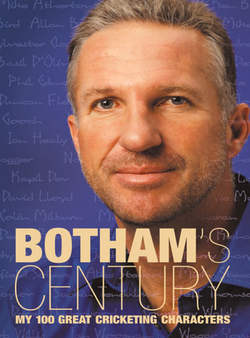Читать книгу Botham’s Century: My 100 great cricketing characters - Ian Botham, Ian Botham - Страница 24
Colin Croft
ОглавлениеAs anyone who has listened to or read the thoughts of Colin Croft as a commentator on radio or for the cricket website ‘Cricinfo’ will surely agree, the least celebrated of the great West Indies ‘fearsome foursome’ is never short of an opinion or five. Try this, about Angus Fraser after the West Indies polished off England in the Guyana Test of 1994: ‘His bowling is like firing at F-16 fighters with slingshots. Even if they hit, no damage would be done. Like an old horse, he should be put out to pasture.’ Say what you mean, Croftie.
I rarely argue with the big man now. During our playing days, such a tactic was definitely straight out of the manual entitled: ‘Test cricket for idiots, Vol. 3: How to get your head knocked off.’ For me, the story that best summed up exactly why I back off concerns an incident that took place during England’s 1980 Test tour of the Caribbean. Clive Lloyd and I, as captains, were very keen on our players going into the other team’s dressing room after close of play – not all the time, but from time to time, to relax and unwind with the opposition over a beer. We both felt this was an excellent way of defusing any conflicts that might be developing, and showing that no matter how hard we were trying to beat each other, we didn’t have to be at war off the field as well.
After one particularly sticky day during which the atmosphere on the field had became a little overheated, Clive thought the time was right to bring his guys in, and in they all came. All, except Croft, that is. Clive noticed he was absent and called back across the corridor separating the two changing rooms: ‘Come on, Croftie! There’s a beer for you here.’ Still he wouldn’t budge so, after a while, Clive left our room to find out what was the matter. When he returned he looked a little shaken.
‘Croftie isn’t coming,’ he said.
‘Why not?’ I asked.
‘Well,’ said Clive, ‘he told me he couldn’t bring himself to drink with fellahs he was trying to kill.’
‘Come off it, Hubert,’ I smiled, ‘He’s only having a laugh.’
‘I don’t think you quite understand,’ explained Clive, ‘Croftie doesn’t have a sense of humour.’
If any of our blokes asked me where Croft was that evening, which otherwise went very well by the way, I told them he was having treatment.
Kiwi umpire Fred Goodall found out what happens when you upset the big man, big time. It was on the notorious West Indies tour of New Zealand in 1980, when Clive’s men lot their rag with the officials and at one stage, during the second Test in Christchurch, threatened not to take the field unless Goodall was removed from the action. The incident involving Croft happened after Goodall decided, in his wisdom, to no-ball the fast bowler. Croft’s response was nothing if not straightforward. On his way to the wicket to deliver the next ball, the giant paceman sent Goodall flying with a shoulder-charge that would have made Roy Keane proud.
Croftie’s mum knew what kind of demon she’d produced. ‘When I hear Colin bowl de bounces, I get vexed,’ she explained. ‘Two bounces an over okay, but when he bowl five I get vexed bad. I tell him, what happen if he hit batsman and he fall dead on de spot?’ Sadly for batsmen the world over, Mrs Croft’s protestations had no effect.
I found batting against Croft one of the more challenging experiences of my career. Bowling from wide of the crease with an awkward, gangling action he was always at you, it was extremely difficult to pick up the length of the ball – which varied from short to very short – and he never seemed to give you any width to work with. He absolutely detested getting hit, which only happened once in his career, to my knowledge, when Viv took him on and destroyed him, playing for Somerset against Lancashire on a real flyer at Southport. And he was one of those rare athletes who actually seemed to get stronger the more he bowled.
After packing up the game, Croft took it upon himself to learn to fly, put in the work, got his pilot’s licence and now flies commercially. Normally, when I hear the words, ‘This is your captain speaking’, deep sleep follows imminently. I think in his case it would be a good idea to make an exception and take notice.
